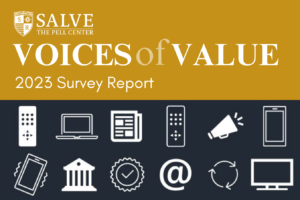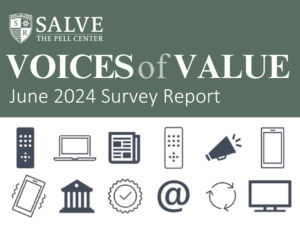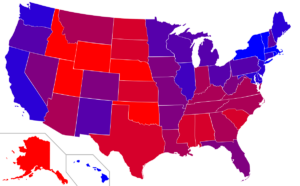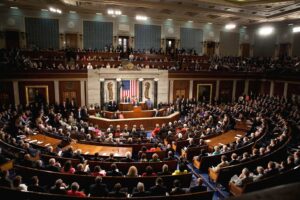Political Polarization
Over the last two decades, Americans have become increasingly concerned about the health of U.S. democracy and the pervasiveness of political polarization. We are inundated with news of political strife and of the extremist positions of the political ‘other’ from our politicians, the media, and our friends and family. Often, the rhetoric around polarization is an over-simplified narrative of a complex issue, however.
The Pell Center’s project on U.S. political polarization adds nuance to this multifaceted problem while highlighting our shared identity as Americans. Through studies, events, and surveys, we explore the causes and impacts of polarization to better identify ways out of this pervasive conflict.
Through a recognition of the complexity of the issue, we can move away from ‘us vs. them’ thinking, which relies on over-blown stereotypes, towards a more empathic approach to political disagreement. Concern for the health of our democracy is bipartisan—we need to find solutions that are too.
Voices of Value Survey Project
Since the mid-1990s, the percent of Democrats and Republicans with a highly unfavorable views of the opposing party has tripled (Pew, 2022). But while negative views of the ‘other’ have risen, policy stances and ideologies have not become more extreme. Political polarization in the United States is thus characterized by a growing distrust of the those on other side, rather than stark ideological differences.
Through polling and in-depth interviews, Voices of Value is a project to support a nuanced understanding of political polarization, encourage an empathetic approach to dissenting political opinions, reduce stereotyping and highlight commonalities.
November 2023 Survey
As the first component of the project, a Pell Center poll was conducted to better understand Rhode Islanders’ views on important and timely political issues facing both the state and the nation. Registered voters in the Ocean State answered questions on topics like the health of U.S. democracy, the top contributors to polarization, and trust in news media. The data show Rhode Islanders are generally concerned about the health of U.S. democracy and rising levels of political polarization, but the root causes of concern vary starkly by political party affiliation.

June 2024 Survey
In the second Voices of Value survey, likely voters in Rhode Island answered questions about the upcoming elections, contributors to political polarization, the health of U.S. democracy, and their news consumption habits. The survey also asked about Rhode Island-specific affairs, including job performance of state officials.
Rhode Islanders are generally concerned about the impact of misleading information on the 2024 election cycle and over two-thirds avoid the news, at least sometimes.

The 2023 Polarization Index: A Holistic Analysis of the State of U.S. Political Strife
The Polarization Index was created to help us better understand how polarized the American public is really. Grasping the ways in which we are polarized – to what degree and over what issues – and identifying the areas of bipartisan agreement will give us a stronger foundation from which to make progress.
Each of the four parts of the Index cover various aspects of political polarization, like the differences between ideological and affective polarization, polarization in the federal government, and the role of the news media in the political divide. The reports present data from a multitude of reputable sources to provide a holistic understanding of partisan polarization in the United States.
Reports will be updated regularly to track progress – or the lack thereof – in these areas.

PART I: Perceptions of U.S. Polarization
Part I (Sept. 2023) analyzes perceptions of the stability of U.S. democracy and the rise of affective polarization, a deep dislike and distrust of those in opposing political party absent major ideological shifts.

PART II: Complexities of Issue Polarization
Part II (Sept. 2023) tackles ideological polarization, comparing the major political parties’ beliefs on important policy issues, like the economy, climate change, and gun rights.

PART III: The Federal Government and Polarization
Part III (Oct. 2023) analyzes polarization in the federal government, with a section dedicated to each of the three branches. It includes original data analysis on the history of bipartisan legislation in Congress, providing ‘bipartisan scores’ for every Congress between 1945 and 2022.

PART IV: Media and Polarization
Part IV (December 2023) covers media and disinformation with data on Americans’ approach to news consumption and their perceptions of bias in the media.
